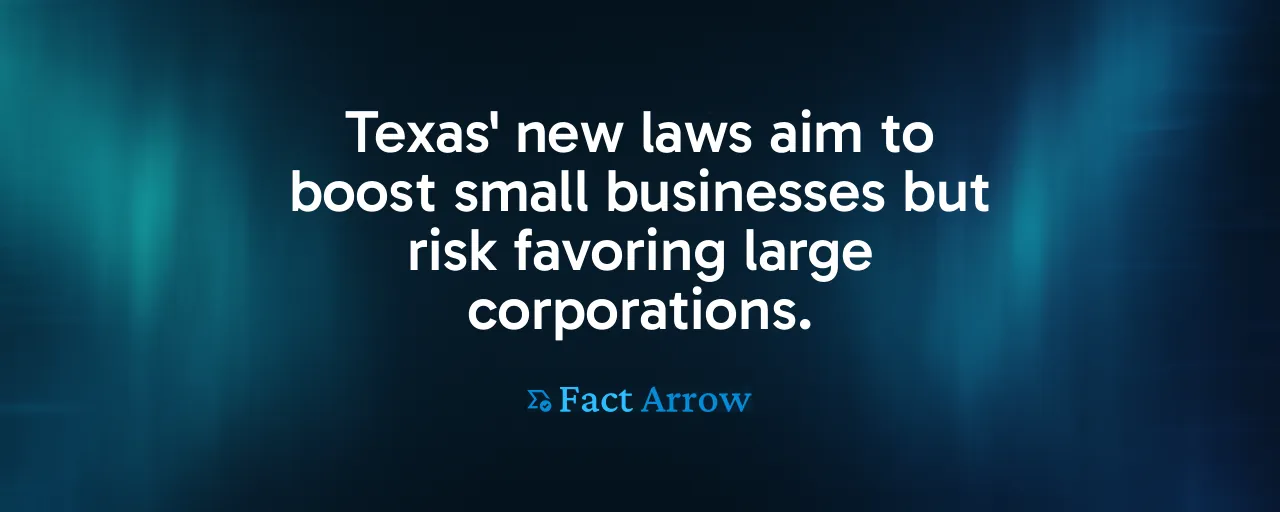The Glitter of New Laws
In June 2025, Texas Governor Greg Abbott signed a package of bills, waving the flag for small businesses. House Joint Resolution 1, House Bills 9, 346, 2464, and 5195 promise to ease taxes, cut regulations, and speed up startups. The message is clear: Texas wants to be the best place to launch a dream. It's an appealing vision, one that tugs at the heart of every entrepreneur.
But dig deeper, and the shine fades. Small businesses power our neighborhoods, creating jobs and character. They deserve policies that match the hype. These laws, though, spark doubts. Are they built to lift the corner store, or do they quietly tilt the field toward corporate giants?
Tax Relief That Misses the Mark
House Bill 9 increases the business personal property tax exemption from $2,500 to $125,000, potentially freeing 67% of small firms from this burden. It sounds like a game-changer. Yet larger companies, with vast inventories, pocket far bigger savings. A May 2025 National Small Business Association report reveals nearly two-thirds of small business owners feel crushed by economic uncertainty. Tax breaks that disproportionately favor the big players deepen that strain.
Looking back, state incentives have surged since the 1990s, often channeling wealth to multinationals while small firms face steeper tax loads. Advocates for economic fairness push for targeted relief, like credits for low-wage workers or family caregivers, which would strengthen communities. Why craft policies that lift the already powerful when small businesses need funds to expand and thrive?
The Price of Loose Rules
House Bill 2464 stops cities from regulating certain home-based businesses, pitched as a win for freedom. But this move strips local governments of tools to protect workers and residents. A 2017 Pew survey found many who advocate for public protections view regulation as vital for public safety. Without local rules, risks like unfair labor practices or unsafe products could grow. The 2008 financial crisis proved that weak oversight invites chaos, leaving communities to clean up the mess.
Supporters of these bills call regulations a burden. Yet workers' rights advocates argue that loosening rules often hurts the vulnerable most. Strong communities, where small businesses flourish, rely on fair wages, clean air, and safe workplaces. Why risk those foundations for a vague promise of growth?
Digital Gains, but Not for All
House Bill 5195 urges state agencies to upgrade websites, while House Bill 346 speeds up business filings, especially for veterans. These nod to digital transformation's potential, with an AWS survey showing 89% of government leaders banking on AI to save billions. But rural and minority-owned businesses often lack reliable broadband. Without equal access, these reforms could widen existing gaps.
Decades of evidence, from Estonia's e-government to U.S. pandemic-era digital shifts, show tech can boost efficiency and trust. Yet Texas' plan skips a crucial step: ensuring everyone can connect. Pairing these laws with rural broadband grants or training for small firms would make the benefits real. Why settle for half-measures when inclusive growth is within reach?
Building a Fairer Future
Faster filings and veteran exemptions offer real help. Small businesses require affordable credit, robust training, and rules that level the playing field to truly thrive. Programs like the American Rescue Plan's credits or SBA training show what's possible. Why lean on tax cuts that trickle up instead of investing in workers and owners?
Some defend these laws, citing Trump's 2017-2019 deregulation, which they claim spurred GDP growth. But small firms saw little of that boost, and inequality widened. Economic justice advocates propose a better way: credits for clean energy, trades, or caregiving, paired with strong protections for workers and the environment. That's how you grow an economy that works for all.
Texas has a chance to lead, to craft policies that see small businesses as the pulse of our towns. Let's push for laws that invest in people, building communities where everyone has a shot at success.
